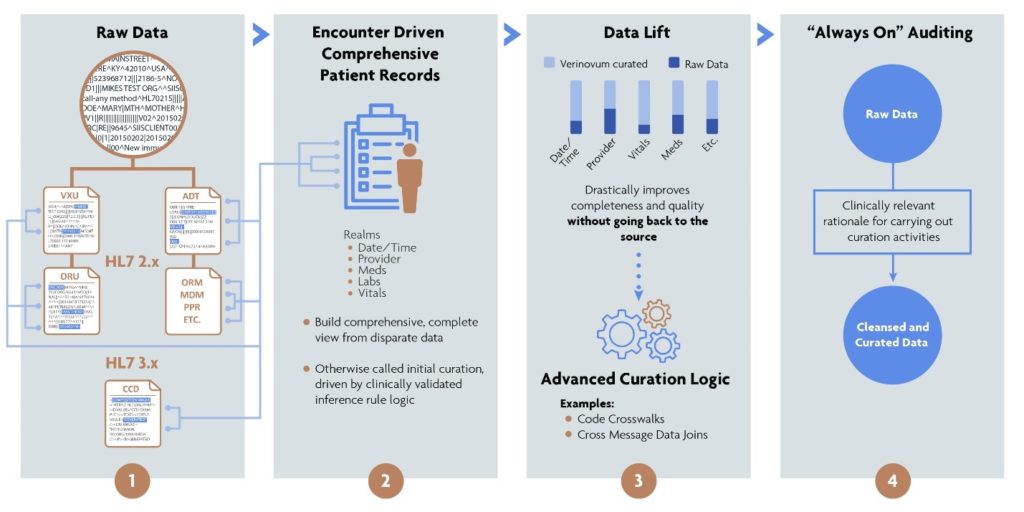Three Hot Topics at AHIP Digital Health 2019 – Conference Recap
Last month, just before the holiday season kicked into full gear, Verinovum attended the AHIP Consumer Experience & Digital Health Forum, held December 10-11 in Chicago.
“When consumers have better health care experiences, it’s better for everyone,” says the AHIP website, promising an event where attendees would “get even better at identifying the best solutions for your toughest challenges. Better at improving outcomes, containing costs, managing growth, and streamlining processes.”
Truly, those challenges are top of mind for all payers, providers, and ACOs as we move into the new decade. The last 10 years have brought a staggering amount of new digital and technological solutions to the healthcare space, and with them, new obstacles to overcome. We have no doubt that the next 10 years will bring changes we can’t yet imagine.
Here, we breakdown three of the hottest topics discussed at AHIP:
1. Payer-provider collaboration
We’ve reached the point where payers and providers both understand that seamless access to both clinical and claims data makes for better patient care. Presenters who covered this topic at the conference included Victoria Losinski, Director of Portfolio Strategy from BCBS Minnesota and Alan Hutchinson, VP of Pop Health from Epic. Now, however, it’s time to look at the technology that can bring us there.
As an article in Health Data Management notes, “No matter how much data is captured within a system, its value is greatly diminished when it can’t be shared with other systems, groups and organizations. When left in their separate data silos, resources, outcomes, revenue and other areas are negatively impacted.”
To achieve this, Verinovum’s clinical data aggregation solution alleviates the burden of segmenting and transmitting data by payer roster, allowing for streamlined integration of clinical information, thereby facilitating value-based care. In addition to distilling the clinical information by payer, Verinovum can curate the data before delivering it to health plans, separating it out by desired use case—for example to look at hospital admission rates for diabetics in a certain zip code, or to assess outcomes by provider for certain disease conditions.
Learn more about how Verinovum can help you bridge the gap between clinical and claims data: https://www.verinovum.com/data-noise-white-paper-lp/
2. The 21st Century Cures Act and TEFCA
One topic that kept coming up in both formal presentations and discussions among peers throughout the AHIP event was the future of TEFCA 2.0. Nicholas Coussoule, CIO from Blue Cross Blue Shield Tennessee, and Melinda Buntin from the Department of Health Policy at Vanderbilt University School of Medicine touched upon this in their conference presentations.
On April 19, 2019, the Office of the National Coordinator for Health Information Technology (ONC) released the long-awaited second draft of the Trusted Exchange Framework and Common Agreement (TEFCA), a proposed strategy mandated by the 21st Century Cures Act of 2016 that provides the industry with the policies and standards necessary to enable true data interoperability and exchange of patient data.
According to ONC, Draft 2 of TEFCA “is designed to scale electronic health information (EHI) exchange nationwide and help ensure that health information networks (HINs), health care providers, health plans, individuals, and many more stakeholders have secure access to their electronic health information when and where it is needed.”
The ability to share and access information across all health care channels, as TEFCA demands, would dramatically improve care coordination. It would bring providers, patients, and caregivers together, resulting in more robust, complete, holistic care. And it also has the potential to increase efficiency while reducing costs.
As hospitals, health systems, and payers prepare to comply with the guideposts outlined in TEFCA and meet Health and Human Services’ larger push for interoperability head on, they’ll need to have complete, enriched, actionable data—and solid data governance practices—in place in order to effectively share large volumes of data from multiple sources.
Read more about preparing your healthcare data for TEFCA: https://www.verinovum.com/2019/09/for-the-record-interoperability/
3. Clean data as a foundation for the future of AI
The next decade will continue to bring advancements in healthcare AI, changing everything from the way we interact with patients to billing and administrative processes. A few presenters at AHIP discussed the promise and challenge of AI, including Rajeev Ronanski, SVP/Chief Digital Officer of Anthem, and Faraz Shafiq, Chief Artificial Intelligence Officer of Cambia Health Solutions.
According to a report from technology consulting firm Infosys that surveyed business and IT decision makers in the healthcare industry, 51 percent said their organizations are already experiencing disruption due to AI, and 71 percent “strongly or somewhat agreed” that their future business plans will be informed and transformed by AI.
Yet only with this solid foundation of enriched, actionable data and an efficient, ongoing data governance strategy can healthcare organizations be prepared for this next wave of innovation.
Despite its obvious value, clean data on its own can only take you so far. Once your organization has a strong foundation built on the highest-quality data possible, you’ll need a formalized, repeatable, strategic data governance process.
The overall goal of data governance is to encourage organizations to transform data into insight. Without governance, your chances for sustaining business improvements you make based on analytics diminishes rapidly over time. Effective data governance focuses on all phases of data: creation, extraction, cleansing, storage (including backup, recovery, and replication), refining, analysis, transformation, and appropriate use. Resistance to data governance is common and a value proposition for data governance must be developed prior to implementing governance policies, procedures, and processes.
Learn more about how strong data governance can lead to success in implementing AI: https://www.verinovum.com/data-governance-white-paper/
Looking to the future
Whatever your organization’s goals in the new decade, clean, curated data will either be what gets you there or what stops you in your tracks. Verinovum was pleased to spend some time with the industry’s leading thought leaders and innovators in digital health in Chicago, working together to pave the way forward.
Do more with Verinovum.
